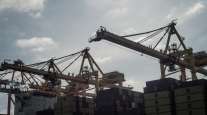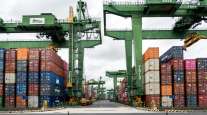Why You Should Stop Worrying About 'Peak Trade'

Are trade volumes — the bedrock of globalization — on life support?
The Brexit vote, the rise of Donald Trump, and shifting economic sands have fed fears that protectionist sentiment will intensify the five-year slowdown in worldwide trade. The precarious outlook for globalization was a hot topic at the Bloomberg Markets Most Influential summit in New York the week of Sept. 26. Karthik Sankaran, head of global strategy at Eurasia Group, brought attention to the fact that Trump "led the first 30 minutes" of the first presidential debate on the negative impact of free trade for U.S. workers, reflecting how protectionist sentiment has risen to the top of the political agenda.
"This year for the first time in decades trade will probably grow more slowly than GDP worldwide," added Princeton University Economics Professor Alan Krueger, "and that's a sign, I think, of moderation," he said when addressing the question of whether globalization was losing steam.
In September, the World Trade Organization forecast that global trade will expand at its slowest pace since the financial crisis this year, also downgrading its projections for 2017, in part due this creeping wave of protectionism. It predicted inflation-adjusted growth in GDP, known as real GDP expansion, would be 2.2% in 2016.
The weak data emboldens those who worry the global trade slump is structural rather than cyclical, and who believe trade volumes could stay depressed even once the global economy stages a spirited recovery from the financial crisis.
Not so fast, warn economists at Goldman Sachs Group Inc. They say that trade volumes today shouldn’t be compared to their 2002-2008 heyday, which they call an historic outlier, but mapped against a longer-term trend against which current volumes look somewhat less alarming.
The Goldman economists also argue that there's little evidence that the forces that have driven an increase in cross-country trade links in the post-war era have materially weakened.
"The global trade slowdown does not appear to be the beginning [or the middle] of an ongoing, downward deviation from a 70-year trend of globalization, but instead marks the abrupt end of a decade-long upward deviation from this long-run trend — the trade boom of the 2000s," Goldman analysts, led by Ian Tomb, wrote in a research report last week.
During that period from 2002 to 2008 the value of global trade rose by an annual 12.5%, the Goldman economists calculate. To illustrate the unique boom of the 2000s, the analysts plotted the gaps between measured trade growth and its expected growth, as implied by GDP expansion between 1960 and 1995.
Measured this way, "aside from the trade boom years of the 2000s, global trade growth over the past two decades, including the late 1990s and the post-2011 period, falls within one standard deviation of this historical benchmark," the analysts explained. It is the rapid trade growth in the 2000s that was unique, not the current cycle.
What's more, they find little evidence that the sensitivity of trade-volume growth to GDP expansion, known as the trade beta, is weakening, as peak-trade proponents assert. The latter argue business and economic shifts mean output growth is failing to turbocharge increasing import-export volumes like it did in the past — a big reason to be bearish about export volume growth in the coming years, even if protectionist sentiment wanes.
However, drawing on data that tracks 400,000 individual trade flows over the past 20 years, the trade-beta exhibits year-on-year volatility at the country-level and was actually historically weak during the booming noughties. That suggests the metric can't "reliably represent the actual effect of income growth on trade growth," the economists conclude.
They don't rule out the idea that the relationship between output growth and trade volumes has changed with time, but they proffer an intuitive conclusion on the current cycle: GDP growth is still driving trade volumes, while other forces, such as financing costs and government policies, "have played the starring role in driving global trade over the past two decades."




